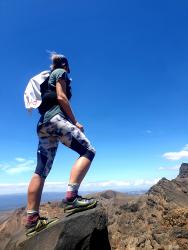
Brooke Thomas had the power and endurance to be a rising star in the demanding world of competitive rowing—until a shocking diagnosis ended her career. She found out she had a type of heart arrhythmia known as long QT syndrome (LQTS), which causes chaotic heartbeats that can lead to fainting or seizures. Strenuous activity often worsens the condition, and Brooke soon found herself permanently sidelined from rowing, unable to compete without risking her health.
Brooke’s training as a nurse helped her cope and learn to live with her condition, but nothing prepared her for the emotional toll of her diagnosis. She felt a glimmer of hope when her doctor recommended that she receive an implantable cardioverter defibrillator (ICD), a device that could continuously monitor her heart for irregular heartbeats—and if one is detected, can deliver a life-saving electrical shock to normalize her heart rhythm. After receiving the ICD, or her “lucky outcome” as she calls it, Brooke began running outdoors in her native New Zealand.
“[Receiving my implant] was a pretty significant impact on my sport, in my life, and my passion,” said Brooke. “On most days, I’m running long distances and up mountains on my own, which is incredible to do without worrying anymore. It’s reassuring knowing that I am being monitored and have protection from irregular heartbeats.”
Going the distance with her S-ICD
In early 2021, Brooke set out to complete her biggest physical challenge since the implantation of her device: completing a trek on the 3,000 km Te Araroa Trail, which extends roughly the length of New Zealand, in approximately eight weeks. Not only did she run the distance, but she also beat the women’s record for the route by nine days.
A few days after completing the run, Brooke shared a heartfelt message on social media reflecting on her experience. “This was, without a doubt, the toughest challenge I have ever undertaken. Yet somehow all the moments of struggle, exhaustion, frustration and disbelief are so quickly forgotten in comparison to the excitement, raw happiness and gratitude that I experienced throughout this journey.”
Moving over tough terrain and pushing through the challenging parts of the trail, she says, is like the process of challenging oneself in life. “You get to the top [of the mountain], and you have an incredible view all to yourself. Everything is suddenly clear.”
A passion to help others with heart conditions
As exciting as it was to break a national record, her journey was about more than overcoming obstacles and pushing personal boundaries. She used her record-setting experience as an opportunity to raise tens of thousands of dollars for Heart Kids, a nonprofit in New Zealand that supports children living with heart defects.
“It took 10 years to get to the point where I am today,” said Brooke of her renewed sense of strength and confidence. “I would like to marry the knowledge I’ve gained from my nursing career and experience as a patient with my passion for the outdoors to help advocate for other patients going through similar experiences—and help them figure out their own boundaries.”
Read safety information for implantable cardioverter defibrillators. Results from case studies are not necessarily predictive of results in other cases. Results in other cases may vary.